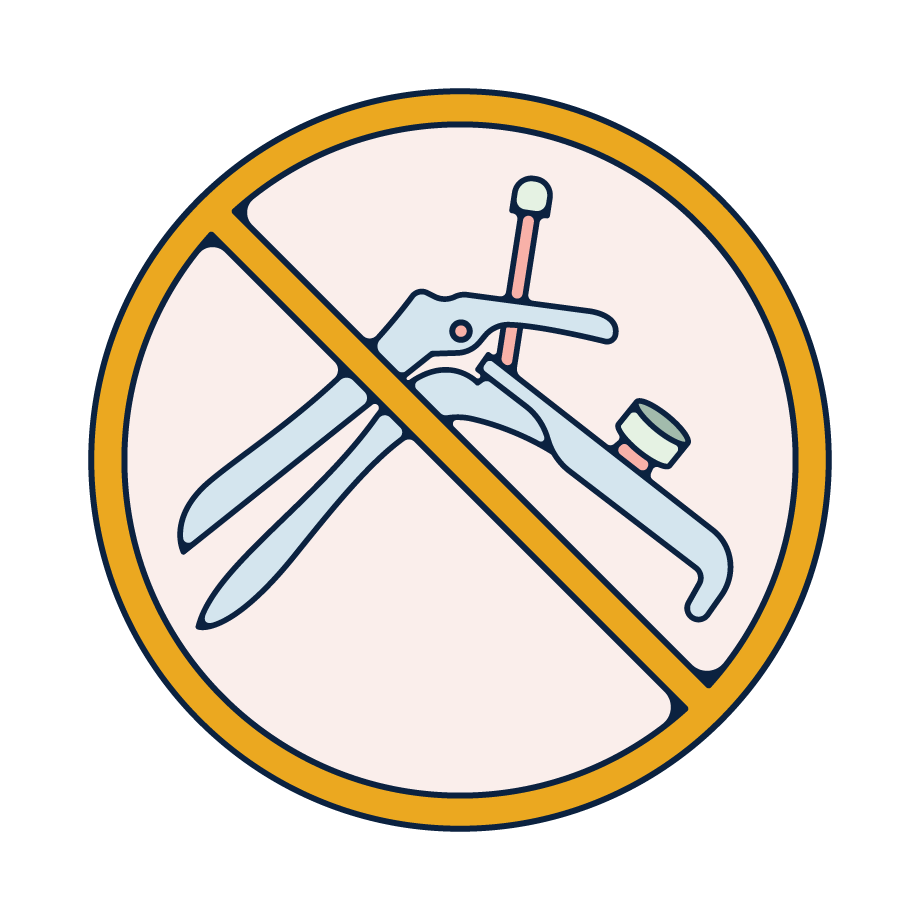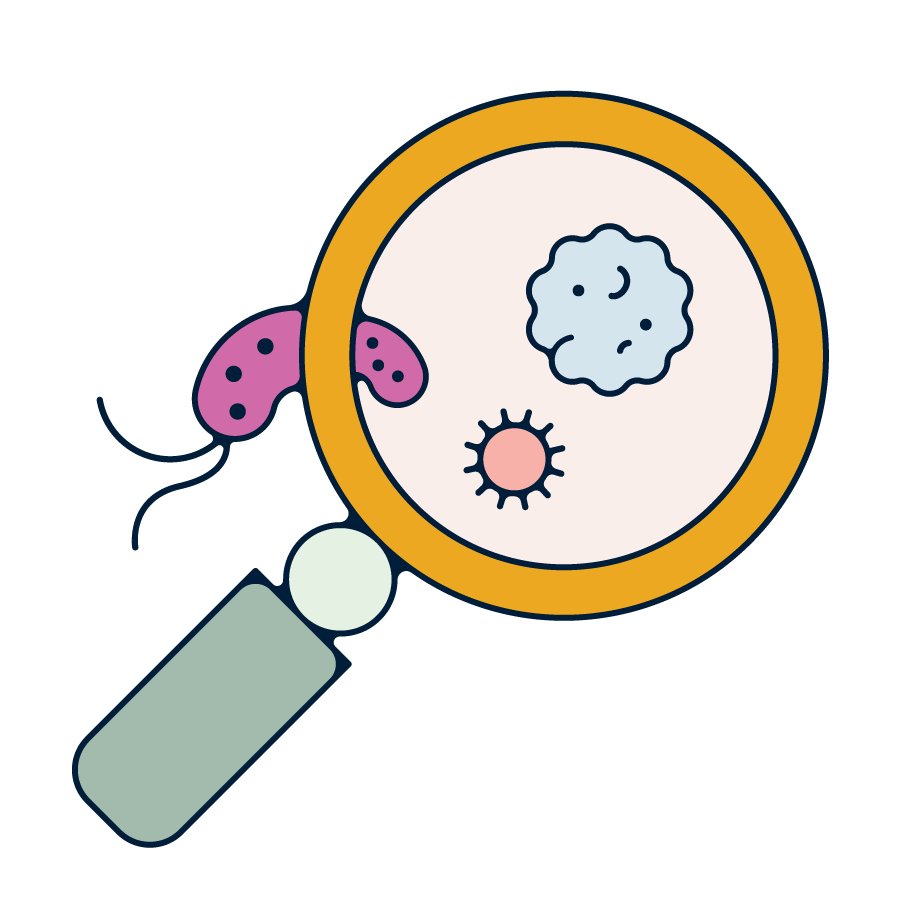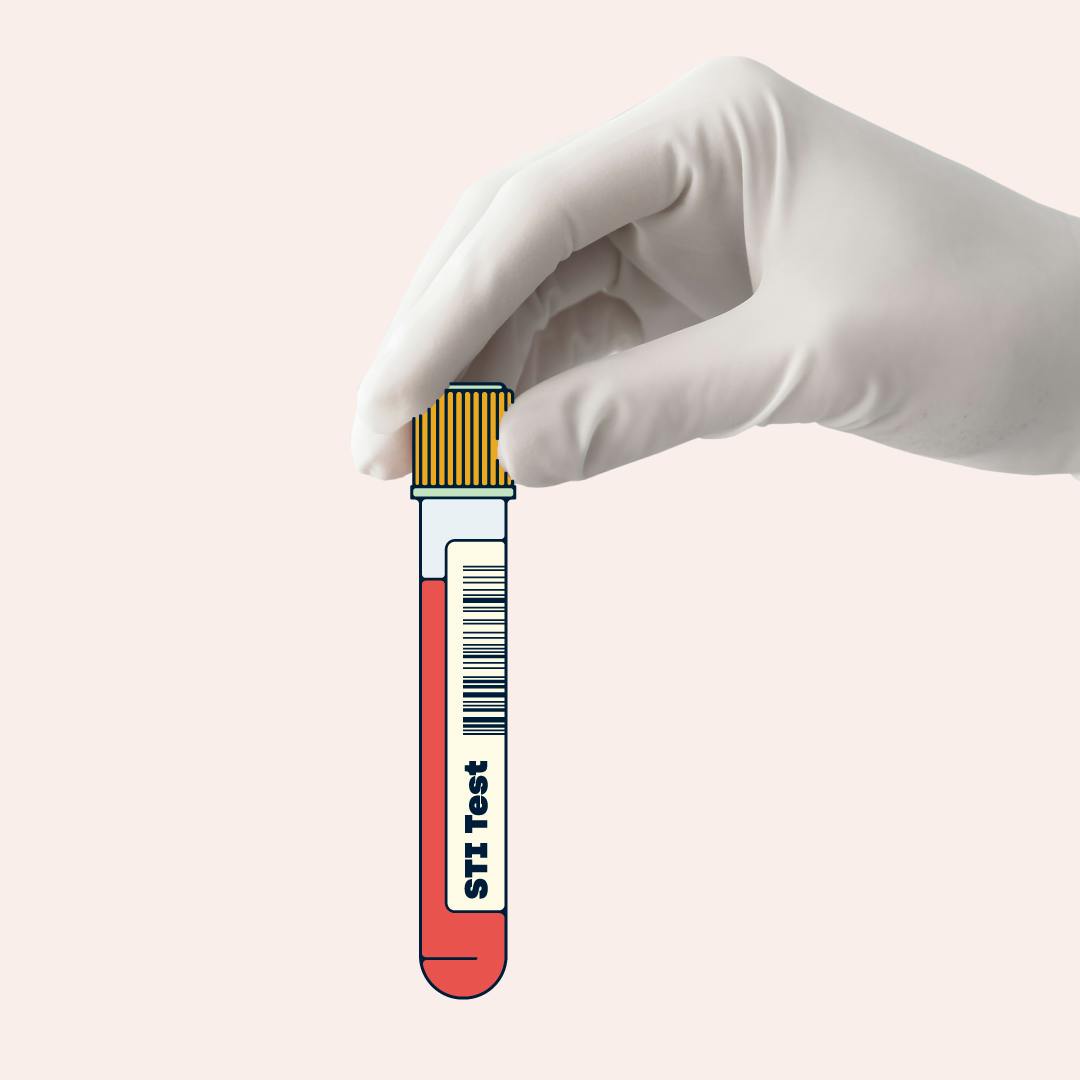Table of contents
1. STI testing is a normal part of your health
2. It's not very painful or uncomfortable
3. You won't be judged
4. You can often take your own samples
5. You can even do an STI test at home
6. You’re keeping people safe
7. Ultimately, STI testing puts your mind at ease
Medically reviewed by Sarah Montagu (NPs, SRH). Sarah is a highly-qualified sexual and reproductive health nurse with 15+ years of experience.
Illustrated by Sabrina Bezerra, Erin Rommel & Valentin Slavov.
If you've been putting off getting an STI test, you're not alone. While there were 311,604 STIs diagnosed in England in 2021, many people still put off getting tested. Why? In one survey of 2000 young people, 26% said they had not been for a sexual health test because they were embarrassed or worried about people finding out. Moreover, 20% said they hadn't been tested because they were too afraid to find out their results.
While it's common to feel a little embarrassed, nervous, or worried about getting your first STI test, there's absolutely no need to be afraid. STI testing is a normal and necessary part of life for anyone who is sexually active, regardless of whether you've had one partner or 100. Whether you're worried about particular symptoms, have recently had unprotected sex with a new partner, or just want to feel more in control of your sexual health, getting tested regularly is absolutely essential.
The more you know about STI testing, the less scary the process feels. So, to help put your mind at ease, here are some of the reasons you should never be afraid of getting an STI test.

STI testing is a normal part of your health
STI testing should be viewed as a regular and important part of maintaining your overall health, just like any other medical check-up. If you're sexually active, it's crucial to understand that anyone can get STIs, such as HIV, herpes, syphilis, gonorrhoea, or hepatitis B. These infections don't discriminate based on sexual orientation, gender, or lifestyle choices.
One key thing to remember is that STIs are treatable, and even in the case of HIV, advancements in medical care have made it a manageable condition. Early detection is crucial because the sooner you know about an infection, the sooner you can get treated. This not only helps in effectively managing or curing the infection but also reduces the risk of transmitting it to others. This is incredibly important as left untreated, some STIs can cause serious health problems and lead to infertility.
Out of the over one million sexually transmitted infections that are acquired every day around the world, the majority are asymptomatic so you might not know you’ve got one until you test positive. Regular STI testing is the most reliable way to detect infections, especially since some people with STIs don't ever get symptoms and some STIs don't always show symptoms right away or may have very mild symptoms that are easy to overlook.
By making STI testing a routine part of your healthcare, you're taking a proactive step in protecting your health and the health of your partners.

It's not very painful or uncomfortable
Some of the biggest concerns people have about taking an STI test is that it will be painful or uncomfortable. Don't worry – most STI tests should never be painful and at worst there might be only mild discomfort involved.
Here's a brief overview of common STI tests and what they might feel like:
- Urine Tests: Predominantly used for testing men or people AMAB, these tests are painless and involve simply urinating into a cup. They are commonly used for detecting infections like chlamydia and gonorrhoea.
- Swab Tests: These tests involve using a small swab to collect samples from the vagina, anus or throat. While the swab test is generally not painful, it can be a bit uncomfortable or cause a sensation of pressure. It's a very quick procedure, though, and any discomfort should be brief. These tests can be administered by a health professional or can be self-collection.
- Blood Tests: Blood tests, used for detecting infections like HIV, syphilis, and hepatitis, involve a needle prick, which can be a quick, sharp pain, but it's over very quickly. Again, these tests can be administered by a health professional or can be by self-collection.
In some cases, a clinician may perform agenital exam to check for signs of certain STIs. This can feel uncomfortable for some, especially if you haven’t had one before , but it should not be painful. If at any point you find being examined painful, tell the person doing it and they should stop immediately.
You won't be judged
It's completely normal to feel nervous or embarrassed about getting an STI test. In many parts of society, there's still a stigma around talking about sexual health, which can make it hard for people to be open about STIs. But remember, choosing to get tested is a smart and healthy choice. It's about taking care of yourself and being responsible for your health and the health of others.
When you go to a clinic or see a healthcare provider for STI testing, you're entering a space that's designed to be safe and private. These places are there to help, not to judge. The staff, from the receptionist to the nurse and doctor, understand how personal and sensitive these tests are. They are committed to keeping your information confidential. This means that what you discuss with them, your test results, and even the fact that you visited the clinic stays private.
Doctors, nurses, and other healthcare professionals have a lot of experience with STI testing. They're not there to judge you; they're there to help you. They can give you accurate information and answer any questions you might have. This can be really helpful, especially if you're feeling worried or scared. They can also offer advice on how to stay healthy and prevent STIs in the future.
These healthcare providers are trained to be understanding and sensitive to your feelings. They know that everyone's situation is different and they're used to dealing with a wide range of health issues. So, you don't have to worry about being judged or feeling ashamed.

You can often take your own samples
STI testing has become more user-friendly and less invasive over the years, and in many cases, you can even collect your own samples. This approach is particularly helpful for those who might feel embarrassed about a healthcare provider performing the test or for anyone who values a higher degree of privacy during the testing process.
Don't worry – self-sampling is super easy and you'll be provided with clear instructions about how to take and package the sample. Plus, it can be done at your own pace and in a comfortable environment.
You can even do an STI test at home
Leading on from the previous point, home testing kits have made it easier than ever to get tested for STIs without having to visit a clinic or doctor's office. These kits are convenient, private, and easy to use.
For example,Daye's at-home STI test has been designed to be as user-friendly and comfortable as possible. Instead of using a swab test like traditional at-home STD tests, our kit uses a special tampon which you wear for a short time then send off to the lab. This method of testing for sexually transmitted infections is ideal for anyone with a busy schedule or people who are feeling anxious about going to a clinic. You'll receive results quickly and then can be connected with specialists and personalised treatment plans that are suited to you.
You’re keeping people safe
By getting an STI test, you’re playing an important part in your community – keeping everyone you have sex with safe. Unless you’ve done a recent test, there’s a risk you could be passing on an infection without knowing it. So, if you care about the people around you, it’s important to get tested.

Ultimately, STI testing puts your mind at ease
For many people, worrying that you've contracted a sexually transmitted infection is much more distressing than actually testing positive. Think about it: once you've had your STI test results, you'll know for sure whether you need to start treatment. The faster you get the all-clear or get a diagnosis, the faster you can dispel the anxiety and feel in control of your sexual health again.
Waiting will only make the fear and stress worse. Book your appointment, walk in to a clinic, or order an at-home kit to get tested today!






